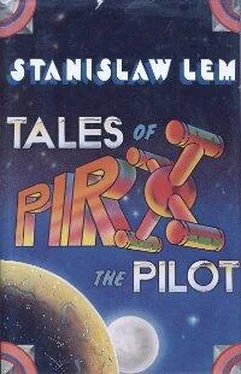After the second disappearance, the CO swung into action. For starters, he had all the ships checked out from bow to stern—atomic pile, flight control systems, every nut and screw; one scratched dial and you were docked a week’s vacation. The timers in the transmitters had to be replaced—as if it were all their fault!—and ships on patrol were now required to radio back at eighteen-minute intervals. Not that there was anything wrong with that; what was bad was that henceforth two senior officers were stationed by the launch ramp, where they ruthlessly confiscated anything in a pilot’s possession—everything from windup birds (of both the feeding and tweeting variety), butterflies, and bees, to various games of skill—in time, transforming the CO’s office into a storeroom for every conceivable sort of novelty. The Base cynics maintained that the CO always kept his door locked because he liked to play with his toys in private.
Given such obstacles, one is better able to appreciate the masterful cunning exercised by Pirx in smuggling aboard his AMU the little house with the three pigs. This despite the fact that, apart from a certain moral satisfaction, he derived little actual benefit from it. The patrol flight was grinding into its ninth consecutive hour. “Grinding” was precisely the word for it. Pirx was reclining in his contour couch, all bound and belted in, mummylike, with only his arms and legs free, and his listless gaze fixed on the screens. For six weeks they had been flying in teams of two, at a distance of 300 kilometers, when Base Command decided to revert to its original tactic, leaving the sector deserted, clean as a whistle, so that even one patrolship was one too many. But just so there wouldn’t be any stellar “holes” on the maps, the solo flights were resumed. Pirx’s was the eighteenth mission to be flown after the team flights were scrubbed.
For lack of anything better to do, he began turning over in his mind all the possible things that could have happened to Thomas and Wilmer. The names of the missing pilots were seldom mentioned at the Base anymore, but nothing is more conducive to idle speculation than prolonged isolation during a manned space flight. He had logged not quite three years’ flight time—two years and four months, to be precise—and already he thought of himself as an old pro. Even so, this time the astro-boredom was beginning to get to him, though he was the last person to advertise it.
Patrol flights have been compared, and aptly so, to waiting one’s turn at the dentist’s—the difference being that here the dentist never shows. Stars that never move, an Earth that either can’t be seen at all or, if you’re extremely lucky, looms as big as the tiny crescent of a bruised fingernail—during the first two hours of flight, that is, after which it assumes the same appearance as any star, in this case a moving one. And staring into the Sun, as everyone knows, is not too advisable, either. It’s times like these that a Chinese puzzle or a brain-teaser becomes an absolute must.
Still, it was a pilot’s duty to hang suspended in a cocoon of belts, to monitor each and every screen—both radar and video—to check the reactor’s idling gauge, and to radio back at regular intervals. Once in a great while, it’s true, he might pick up a distress call—even an SOS!—coming from somewhere inside his sector, and off he’d go, at breakneck speed; but a pilot could count himself lucky if this happened more than once or twice a year.
Under the circumstances, it is hardly astonishing that pilots are subject to myriad fantasies, fantasies which from the point of view of Earth, or of ordinary passengers, might seem wicked, but which in fact are quite normal. When you’re out there, surrounded by 1.5 trillion cubic kilometers of empty space, without so much as a flake of cigarette ash for company, the desire for action—be it even some hideous calamity—can grow to a genuine obsession.
In the course of his 172 patrol flights, Pirx had run the gamut of psychic responses, having been subject to attacks of drowsiness, crotchetiness, even fits of feebleminded eccentricity… and once was on the verge of committing some far-from-harmless prank. Lately he had begun concocting plots to various stories, a hangover from his student days, some of which turned out to be so intricate in construction as to defy finding a resolution before the end of the flight. But did it help to relieve the boredom? Not a bit.
As he ventured into the labyrinth of lonely contemplation, Pirx realized he would never solve the mystery of his two missing comrades, not when the most high-powered experts at the Base had been beating their brains out, for months on end, without cracking it. No, he was better off with his piggy game, a no less idle but certainly more harmless pastime—if only he could get it to work! But the engines were quiet, nor was there any reason to fire them up, what with the ship now cruising along the segment of a protracted ellipsis, one of whose foci was the Sun. No, the piggies would have to wait for sunnier days.
Okay, so what could have happened to Thomas and Wilmer?
An ordinary layman would have presumed a collision with something—with a meteor, for example, with a cloud of cosmic dust, a comet’s tail, or the wreckage of some old rocket ship. But the chances of such a collision’s occurring were about as remote as finding a mammoth diamond in the middle of a busy street; statistics showed, in fact, that the odds in favor of finding the diamond were much greater.
From sheer boredom, Pirx began feeding figures into his computer and formulating equations to compute the probability of a collision. The result was a figure so large that the computer would have had to drop the last eighteen decimal places just to accommodate the number on its displays.
Besides, the sector was empty. No comet tails, no clouds of cosmic dust—nothing. Theoretically, the wreckage of an earlier ship might just as well have turned up here as anywhere else in the universe—but only after an inconceivable number of years. But if that were the case, surely Thomas and Wilmer would have sighted it—say, from a distance of 250 kilometers. Suppose it had approached from the side of the Sun; in that case, the meteoradar would have sounded the alarm a good thirty seconds before impact. And even if the pilot had slept through the alarm, the automatic control would have triggered the yaw maneuver, whereas a malfunction in the automatic yaw control was practically unheard of: it might happen once, but not twice in a row in the space of a few days.
All this a layman might have deduced, a layman who knew nothing of the hazards present aboard ship during a manned space flight—perils far greater than colliding with a meteorite or a decayed comet. A spacecraft, even one as small as an AMU, is made up of nearly 114,000 major parts—major in the sense that a malfunction in any one of them could have disastrous consequences. The minor parts number more than a million. But even assuming a fatal accident, a spaceship would not simply disintegrate into ether—since, to cite an old spaceman’s adage, nothing is ever lost in space: toss out a cigarette lighter, and all you have to do is to plot its trajectory and be in the right place at the right time, and the lighter, following its own orbital path, will with astronomical precision plop into your hand at the designated second. The fact that in space a body will orbit about another to infinity means that sooner or later the wreckage of any spaceship is almost always bound to turn up. The Institute’s megacomputers had plotted more than forty million possible orbits in which the missing ships could be traveling, each of which was probed by concentrated pencils of the most powerful radar tracking equipment available on Earth. With the aforementioned results.
Читать дальше












